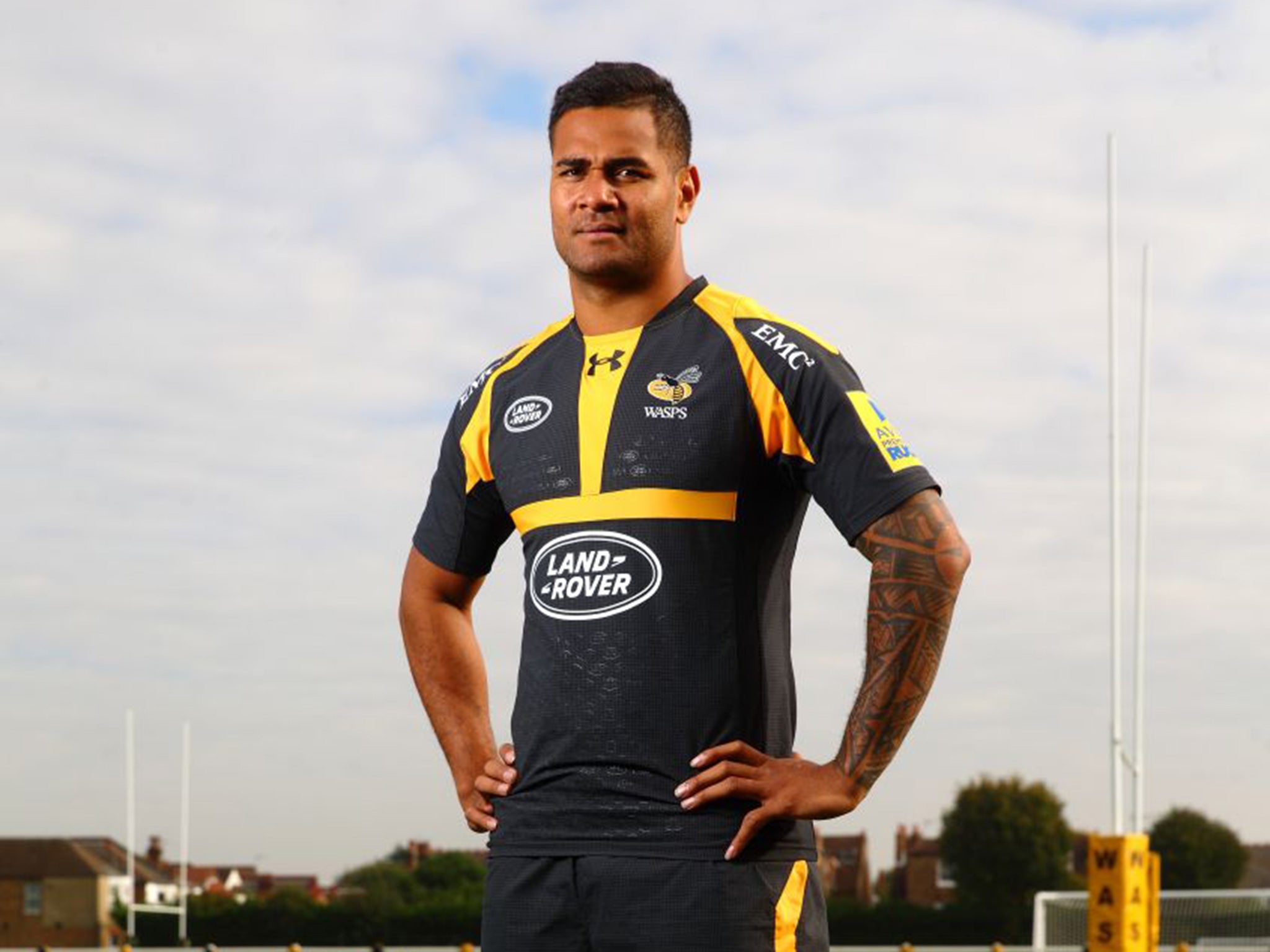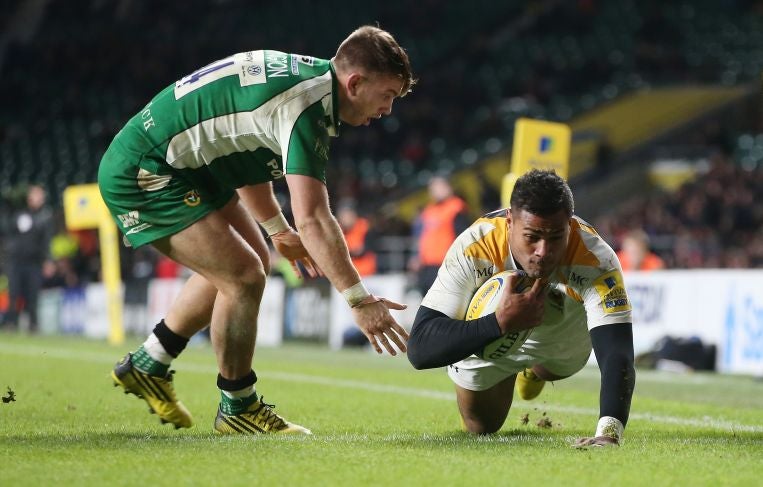Can Wasp Frank Halai really be ‘the new Lomu’?
The big Tongan wing has much in common with the late, great Jonah, as he explains to Chris Hewett – but, with just one New Zealand cap to his name so far, that gives him an awful lot still to live up to

Your support helps us to tell the story
From reproductive rights to climate change to Big Tech, The Independent is on the ground when the story is developing. Whether it's investigating the financials of Elon Musk's pro-Trump PAC or producing our latest documentary, 'The A Word', which shines a light on the American women fighting for reproductive rights, we know how important it is to parse out the facts from the messaging.
At such a critical moment in US history, we need reporters on the ground. Your donation allows us to keep sending journalists to speak to both sides of the story.
The Independent is trusted by Americans across the entire political spectrum. And unlike many other quality news outlets, we choose not to lock Americans out of our reporting and analysis with paywalls. We believe quality journalism should be available to everyone, paid for by those who can afford it.
Your support makes all the difference.They paid their last respects to Jonah Lomu at Eden Park in Auckland this week: the great and the good of New Zealand society, silver-ferned internationals past and present, the man and woman in the street all drawn together by the profound sense of loss that filled the air in a stadium where the All Blacks never lose. And 11,000 miles away, on the other side of the world, Frank Halai was with them in spirit. He and Jonah shared some things.
When Wasps signed Halai in January, he was immediately hailed in the public prints as “the new Lomu”. There were three principal reasons for this: his 6ft 5in, 16st-plenty frame was comfortably substantial enough to put him in the “unusually big wing” category; he had a stellar background in the seven-a-side game, just like his predecessor; and his nickname, “Frank the Tank”, gave him a Jonah-esque air.
If the comparison seemed a little too pat at the time – every brick-outhouse wide man with a South Seas background is lumbered with the “Jonah incarnate” tag the moment he runs over an opponent – Halai’s initial performances in the English Premiership and the European Champions Cup, uniformly impressive in their highly physical fashion, have given the argument some heft. But there is more to it than that. Far more.
Halai was born and raised in Tonga: in Pangai, to be precise – a village of some 2,000 souls on the western shore of Lifuka Island. Lomu was born in Auckland, but spent part of his childhood with family in Holopeka. “That’s a 10-minute drive along the coast from where I was brought up,” says Halai. “Maybe five minutes.”
Unlike Lomu, who returned to Auckland while still a child, the 27-year-old stayed in Tonga until he was 16. “Most of my close family had gone to America and were living in San Francisco for work reasons, so I lived with my grandmother,” he continues. “But my mum’s sister was in New Zealand and one of my brothers was being educated there, so I went to Wesley College.” That would be the same Methodist secondary school where Lomu gave the first indications that he might be a rugby player for all the ages.
You begin to get the picture. Halai went on to play provincial rugby for Counties Manukau, just as Lomu did, and Super Rugby for the Auckland-based Blues, just as Lomu did. “Jonah was a big Counties man,” he recalls. “He’d often come to watch, along with Joeli Vidiri [another All Black wing from the Pacific islands, this time Fiji, who, like Lomu, was forced into premature retirement by a chronic kidney condition]. They’d come into the dressing room and congratulate us after a victory. They were there when we beat Hawke’s Bay in Napier and won the Ranfurly Shield for the first time in our history. That was a big day.

“When I was in Tonga, I played some rugby at school, just like every other kid growing up by the sea. And every kid knew about Jonah, of course – he was such a star, such a hero. But, to be honest, the wing I enjoyed watching most at that time was Joe Roff [the World Cup-winning Australian]. If you were a Tongan kid, you automatically supported the All Blacks. I always liked to be different, so I chose to follow the Wallabies. There was something special about Roff. I just loved the way he played the game.”
That famous Counties victory in 2013 – a red-letter event if ever there was one, given that the team had challenged for New Zealand rugby’s most sought-after domestic prize on 24 previous occasions and missed out every time – would have been comfortably enough to set a crown on Halai’s year of years. He had announced himself on the Super Rugby scene just a few months previously, topping the try-scoring charts in his debut campaign.
But there was better to come: a few weeks after the win in Napier, he was capped by the All Blacks against Japan in Tokyo and marked the occasion with a try.
Not that the “better” lasted for long. Halai found himself up against a stellar bunch of rivals for the outside back positions on the subsequent three-Test trip to Europe – Julian Savea and Ben Smith, Israel Dagg and Cory Jane, his fellow Wesley alumnus and good friend Charles Piutau – and failed to hold his place.
“I wish I’d won more caps – of course I do,” he says. “That first season in Super Rugby worked out for me and put me in a good place with the All Blacks, but 2014 wasn’t so hot and things passed me by. I think my work rate dropped off, although I can’t explain why. What I do understand is that this move to Wasps is good for me. I know I can’t relax here, because if I do I won’t get to play.”
Wasps went looking for a new wing at the back end of last year, when the free-scoring Tom Varndell announced he would be leaving the club for Bristol. At around the same time, Halai was thinking about spreading his wings in a distant corner of the union landscape.
“My agent asked me what I wanted to do when I came off contract with the Blues,” he says. “He wanted to know if I was interested in experiencing something different, because there were teams out there who were keen to sign me.
“I thought about it and decided that a new start might be a good thing for me, so my agent printed out all the details on Wasps – their history, the successes and difficulties down the years, their move from London to Coventry – and I realised there was an opportunity for me there.
“My time in Super Rugby was well spent: I enjoy that style of rugby, which I guess is a little more expansive than a lot of teams play over here. But I really can’t complain about the kind of rugby Wasps have been playing since I arrived: we’re chucking the ball around just like they do back home. And with my friend Charles here, it’s a lot of fun. I know he always breaks the first tackle, so I just put myself on his shoulder and wait for things to happen.”
Piutau, another Aucklander from a Tongan background, joined Wasps on a short-term contract after being left out of the All Black squad for the World Cup. He had already agreed to play for Ulster from the start of the 2016-17 season, but restrictions on overseas players in Irish provincial rugby left him at a loose end. As one of the few players who might have made the recent global tournament even more captivating than it was, his unexpected link-up with Halai has lifted Wasps’ counter-attacking game, already one of the most potent in English rugby, to new heights.
Toulon, the three-time European champions, discovered that last month when they found themselves on the painful end of a four-try shellacking at the Ricoh Arena. Halai set the process in train by running through the France Test centre Maxime Mermoz to set up the first score for the much talked about No 8 Nathan Hughes and continued it with a five-pointer of his own that illustrated the depth and richness of his understanding with Piutau.
It was a sweet moment, even though Halai had spent little of his previous life in New Zealand watching TV coverage of the northern hemisphere game. “I knew about Toulon because of the All Black link – because Tana Umaga and Sonny Bill Williams played there, and because Ma’a Nonu was on his way to the club,” he says. “Those are pretty big names. But we have good players too and we honestly believe that we can beat anyone if we perform to our level. There again, that was only one game. They’ll make it tough for us when we go down there after Christmas.”
Before then, there is a Premiership meeting with Exeter this evening and back-to-back Euro contests with Bath – games in which Halai will have to man the barricades.
“There’s still some work to do defensively,” says Brad Davis, the Australian coach who runs that part of the Wasps operation. “He’s not quite there with our system at the moment, but it won’t take him long. He’s a very good player.”
They used to say the same about Lomu. “Jonah wasn’t the best without the ball,” said the former All Black strategist Graham Henry recently, “but in possession he scored tries you didn’t imagine were possible.” Who knows? Halai may be about to prove he has something else in common with the most celebrated player ever to set foot on a rugby field.
Join our commenting forum
Join thought-provoking conversations, follow other Independent readers and see their replies
Comments